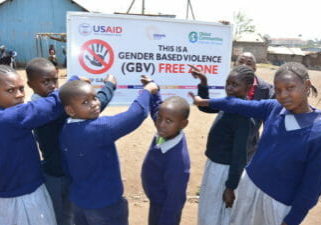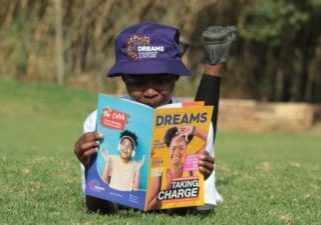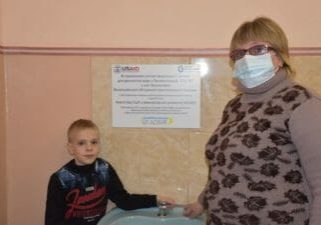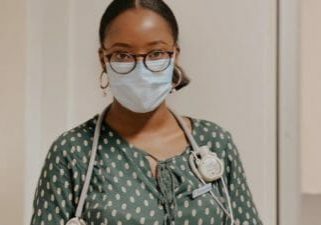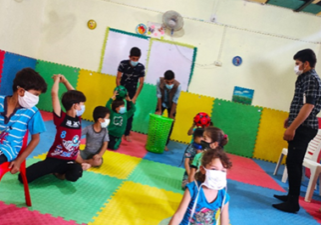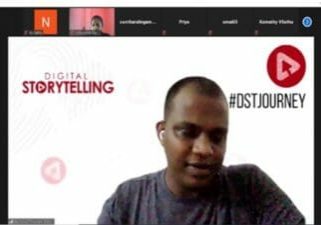News > Blog
USAID SCORE Trainees Use Newly Acquired Tailoring Skills to Help Community During COVID-19 Pandemic
Published 06/11/2020 by globalcommunities
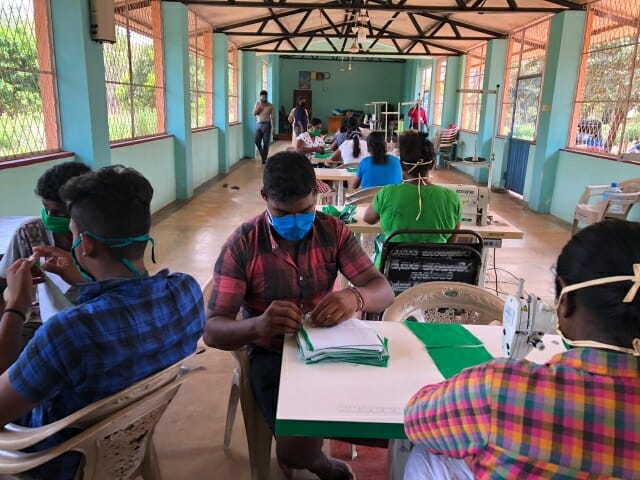
View on USAID website
Ireshika Somapala, a mother of two from the village of Bogahawewa in the North Central district of Anuradhapura, began a six-month sewing and tailoring course under USAID SCORE support through sub-grantee Rajarata Praja Kendraya (RPK), in February. By mid-March, Ireshika began to put her newly acquired skills to good use by sewing masks for the district’s hospital and her community. RPK engaged 10 women including Ireshika to stitch 5,000 masks and provided them to the Padaviya hospital and the area’s Medical Officer of Health offices.
“I stitched masks for the hospital and my community during the curfew period. I hope to increase my knowledge and skills to earn a sound income to support my family once I complete the course,” Ireshika said.
Seven women who joined in the activity were from the nearby village of Sudarshanagama village and three were also from Boghawewa. While the villages of Sudarshanagama and Boghawewa are geographically close to each other, community members generally don’t interact with each other due to caste issues. However, both communities contributed enthusiastically by providing sewing machines and other support. A private garment factory in Bogahawewa provided piping material and machines. The Sudarshanagama funeral society provided the space for women to set up the sewing machines and carry out the work. The women sewing discussed the best ways to sew the masks before sharing their personal stories with each other and becoming friends. The activity created a strong network between the two communities, contributing to the process of building social cohesion.
Since the beginning of the pandemic in Sri Lanka, SCORE has been responding to the needs of the marginalized communities across the island. Hospitals in the former northern and eastern conflict zones, north western Puttalam, north central Anuradhapura, the South, Gampaha and south eastern Moneragala received essential items such as sewing machines, washing machines, cloth to make masks, personal protective equipment, and sanitizers. Multi-ethnic volunteer community participants in SCORE’s working districts stitched masks for hospitals.
SCORE also contributed to the refurbishment of an isolation unit for Covid-19 patients in the Vavuniya hospital with the labor contributed from the Sri Lanka Navy. The Vavuniya General Hospital faced difficulties to provide services to suspected Covid-19 cases while keeping them isolated from other patients. SCORE provided the building materials to establish a partition in the hospital. This enabled the state to build trust with the Tamil community in the area where relations are tenuous due to the conflict.
Also, the SCORE social media youth group that works on promoting social cohesion and reconciliation is now providing information via social media to Moneragala, Batticaloa and Ampara multi-ethnic youth on information related to the pandemic. Their internet posts share information from the Sri Lankan Health Promotion Bureau providing proper guidelines on prevention and countering misinformation about the virus.
About SCORE
USAID’s Social Cohesion and Reconciliation (SCORE) Activity is strengthening Sri Lankan-led efforts to advance social cohesion and reconciliation. SCORE strives to address certain underlying challenges to reconciliation, by fostering a shared and inclusive Sri Lankan identity, reducing socio-economic and political disparities that underpin social cohesion, and enhancing community resilience. Through local grantees, SCORE aims to help marginalized communities affected by 30 years of conflict and other violent incidents to work together to uplift their lives. SCORE activities build trust, hope and confidence among community members and between communities. SCORE strengthens communities to be more resilient in times of uncertainty. SCORE creates or strengthens multi-ethnic community platforms that are comprised of the ethnicities in the community as well as representation of women and youth. The platforms manage the community-selected activities leading to more self-sufficiency and less violent-prone communities.

